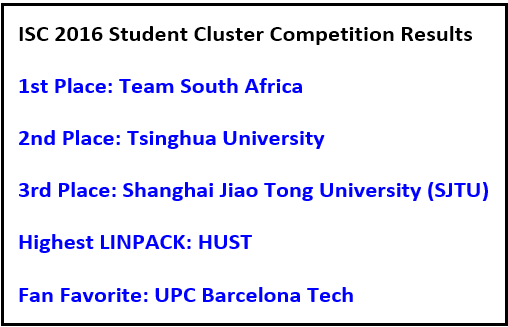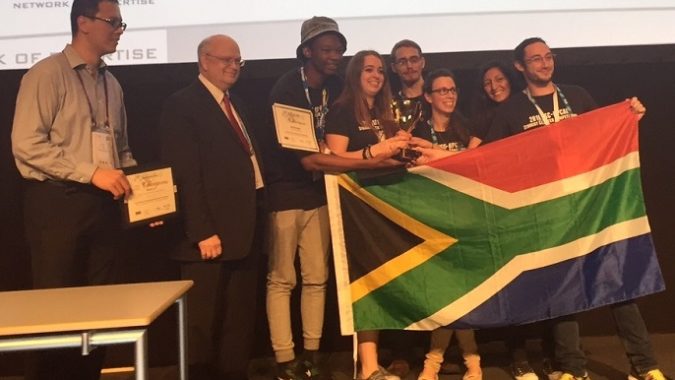At an awards ceremony near the close of ISC 2016 in Frankfurt, Germany, this week, attendees cheered as Team South Africa took to the stage to collect their third HPCAC-ISC Student Cluster Competition championship prize from HPC luminary Thomas Sterling.
“I have to say that this is extraordinary,” said Sterling, who was helping officiate along with Gilad Shainer (of Mellanox). “Last year, I said those South African teams are pretty good. They came in second last year and first the two times before that. This is a remarkable performance.”
The win marked quite the accomplishment for the team, which had support from their home institution, the Centre for High Performance Computing (CHPC); their sponsors Dell and Mellanox; and the community at large. The student team lineup includes Andries Bingani, Ashley Naudé, Avraham Bank, Craig Bester, Sabeehah Ismail, and Leanne Johnson.
The road to becoming three-time ISC 2016 cluster champions kicked into gear with a first-place finish in the annual SA-SCC event, under guidance of team supervisors David Macleod and Matthew Cawood, both of CHPC.
A feature piece on the South African team by HPCwire contributor STEM-Trek‘s Elizabeth Leake highlights their coaching style:
The CHPC won the ISC challenge in 2013 and 2014, but came in second to a Chinese team [Tsinghua University] in 2015. The pressure is on to reclaim their international title in 2016. It’s clear CHPC’s coaching methodology doesn’t emphasize winning, however.
“That’s not to say that we don’t think winning is important, it’s just that we have higher priorities. Our goal is to expose as many students as possible to the HPC field at a time in their education when they can take related courses. This means that year after year we self-impose disadvantages by fielding the youngest and least experienced team in the competition. The fact that we are the only team that does this, yet we’re consistently strong, is the greatest win we could have hoped for,” said David Macleod.
 The team also reflects CHPC’s dedication to gender and racial equity with a diverse mixed-gender team. Coming from the other side of the world, Team NERSC was also girl-powered, representing the first time an all-woman team has competed in the history of the Student Cluster Team contests.
The team also reflects CHPC’s dedication to gender and racial equity with a diverse mixed-gender team. Coming from the other side of the world, Team NERSC was also girl-powered, representing the first time an all-woman team has competed in the history of the Student Cluster Team contests.
Looking at the various system specs for 12 cluster designs, what stands out is Team South Africa’s choice of accelerator. The team opted for NVIDIA Tesla K40s over K80 GPUs and was the only group to do so. They considered K80s but were attracted by the lower power profile of the K40s. Thanks to the team’s sponsors, Dell and Mellanox, their travel expenses were covered and they received some impressive hardware: 10 dual-socket Xeon-E5 2695 v4s nodes (total: 360 cores) connected by EDR InfiniBand. They used eight of these nodes for the application runs.
Other notable innovative architectures this year included:
- A 768 ARMv8 core cluster (from Cavium via their European part E4 Computing) accelerated by 8 NVIDIA JTX1s with 4 ARMv8 cores and 256 Maxwell cores per board (Team Boston);
- An 80-core IBM Power8 cluster (Team Estonia from the University of Tartu); and
- An 864-core Cavium ThunderX-based system (Team Spain from UPC Barcelona Tech).
Team NERSC had the most Xeon cores with 8-nodes of two-socket 22-core E5-2699 CPUs totaling 352 cores, compliments of Intel and Cray, who delivered the hardware to the team in May.
 The Fastest Computer on the Continent
The Fastest Computer on the Continent
As if winning the third gold SCC title weren’t enough reason to celebrate, South Africa has also stood up a new supercomputer, named Lengau (“Cheetah” in the African language of seTswana). Benchmarked at 782-petaflops (LINPACK), the machine takes the number 121 spot, putting it in the top quadrant of the TOP500 list that was announced on Monday. Lengau is comprised of 1,008 Xeon-based Dell PowerEdge server nodes filling 19 racks (with storage). It has a Dell Storage capacity of five petabytes, and uses Dell Networking Ethernet switches and Mellanox EDR InfiniBand with a maximum interconnect speed of 56 GB/s.
A Competition with Surprises
A community favorite along with its counterparts in Asia and in the US, the HPCAC-ISC Student Cluster Competition is jointly organized by the HPC Advisory Council (HPCAC) and ISC. This year, 12 teams from around the world came to build a small cluster of their own design and test their HPC mettle by optimizing and running a series of benchmarks and applications. The catch is to do so without going over the 3,000W power limit.
The first portion of the competition is benchmarking the system with the High Performance Conjugant Gradient (HPCG) and High Performance Linpack (HPL). Next comes the bulk of the contest: four applications that comprise 80 percent of the overall score; only three are known ahead of time. This year’s lineup included the data-intensive Graph500 benchmark; Splotch (a ray tracing algorithm used for visualizations); and WRF, a popular weather forecasting model. The surprise application, CloverLeaf, was a first for the competition; the hydrodynamics mini-app solves the compressible Euler equations on a Cartesian grid.
Teams are scored based on their performance on the HPCC benchmark run (10 percent), a suite of test applications (80 percent), as well as their ability to articulate their strategy and results in front of a panel of expert judges (10 percent). At the awards ceremony, the top achievers are presented with prizes in five categories: first, second and third place, highest LINPACK performance and fan favorite.
And the Winners Are
1st Place: Team South Africa
2nd Place: Tsinghua University
3rd Place: Shanghai Jiao Tong University (SJTU)
Highest LINPACK: Huazhong University of Science & Technology (HUST)
Fan Favorite: UPC Barcelona Tech





























































